We might get killed, but we have to get food, injured Gazan tells BBC
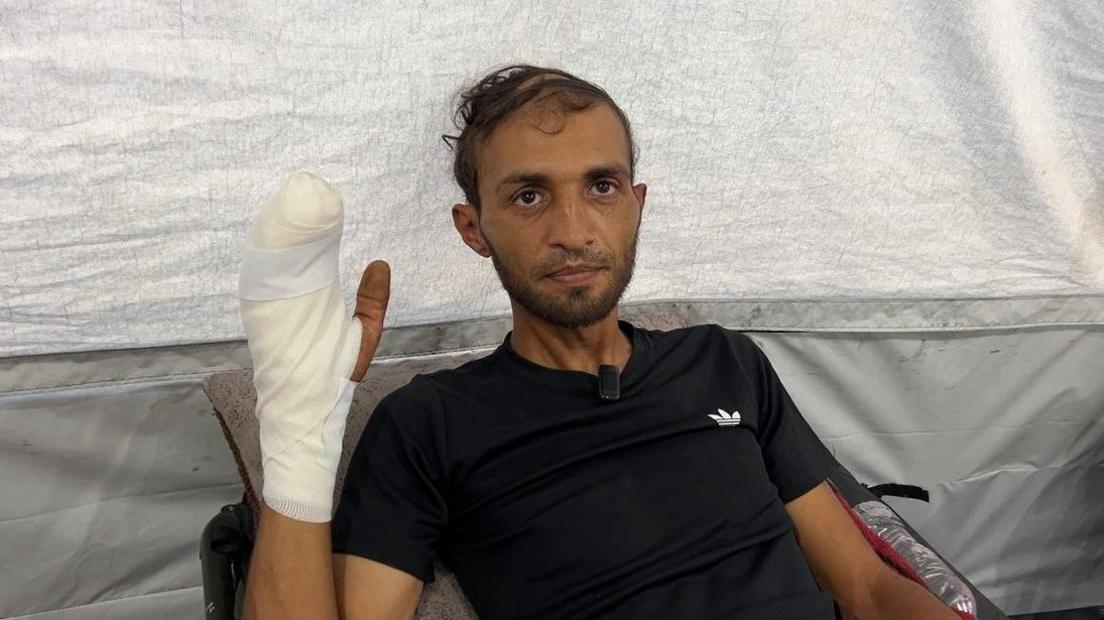
Mohammed al-Qedra said he was shot in the hand and leg while trying to get food at a GHF aid distribution centre
- Published
"Hunger and the lack of everything makes us go there."
"We know that we might get injured or killed at any time, yet we still go there to get a kilo of flour."
Mohammed al-Qedra, 33, is one of the many patients brought to the field hospital run by British charity UK-Med in southern Gaza who sought food but found only violence.
He said he was shot in the hand and leg while trying to get food for his family at a nearby aid distribution centre run by the Israel- and US-backed Gaza Humanitarian Foundation (GHF).
"I was pleading for someone to carry me and take me to hospital. A good Samaritan brought me here," he recalled in an interview with a freelance journalist working for the BBC.
Mohammed said he was aware of the risk he was taking by trying to reach the GHF site, but that he had no choice.
"The famine is bad for me and for everyone."
"Today, I'm eating [at] the hospital. Once I get better, I will go back to these centres no matter what. I'm the sole breadwinner for the whole family."
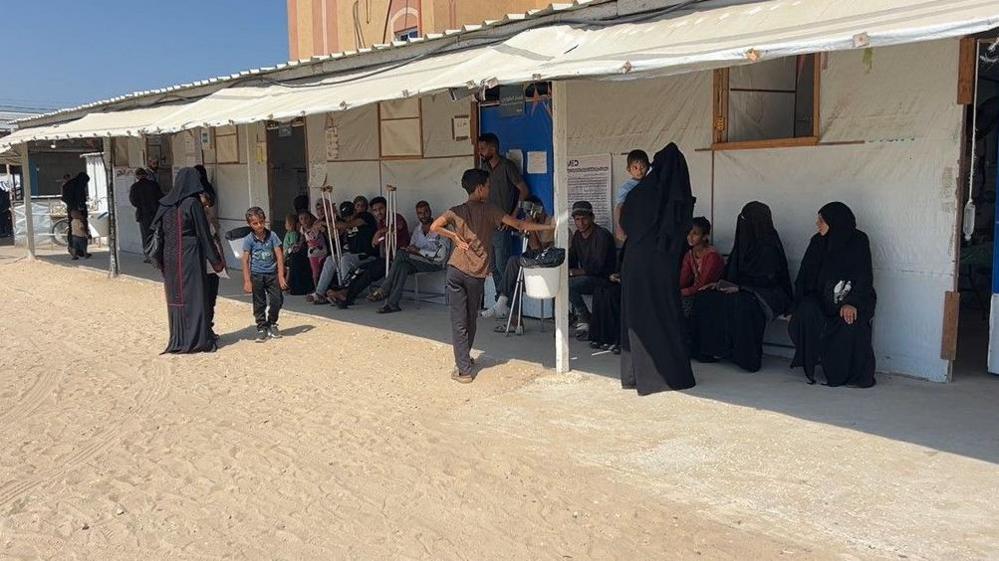
British charity UK-Med operates two field hospitals in Gaza
According to the UN human rights office, more than 1,000 Palestinians have been killed by the Israeli military while trying to get food aid over the past two months.
It says at least 766 of them have been killed in the vicinity of one of the GHF's four distribution centres, which are operated by US private security contractors and are located inside Israeli military zones.
Another 288 people have been reported killed near UN and other aid convoys.
Israel has accused Hamas of instigating the chaos near the aid sites. It says its troops have only fired warning shots and that they do not intentionally shoot civilians.
The GHF says the UN is using "false" figures from Gaza's Hamas-run health ministry.
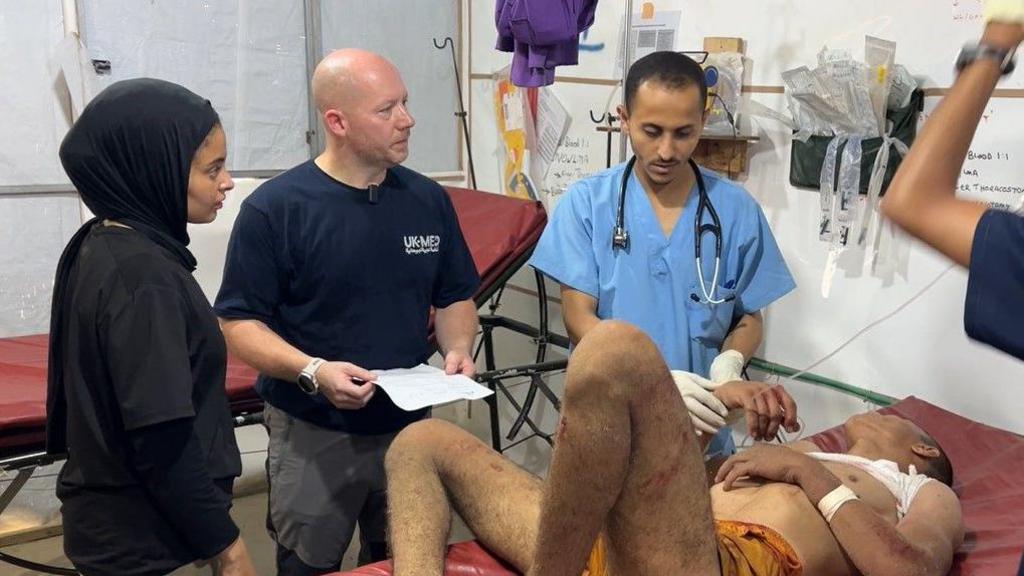
British paramedic Sam Sears (2nd left) says the numbers of patients are "huge"
British paramedic Sam Sears said the UK-Med hospital in the coastal al-Mawasi was seeing approximately 2,000 patients a month in its emergency department, many of them injured while seeking aid.
"We have patients that have sustained gunshot wounds, shrapnel wounds, have leg amputations, have gunshot wounds to the chest, which have caused punctured lungs, and so on," he added, as he walked through the inpatient ward.
Dr Aseel Horabi, a Palestinian medic who has been working at the hospital for almost a year, has herself had to go to the deadly aid sites, calling it a "path to death".
"My husband went once [or] twice and then got shot and that was it! If we are to die from hunger, let it be," she said.
"I see the injured people who come to the hospital in big numbers. We sometimes receive up to 50 injured a day. During the day, we don't have any time to close our eyes and have some rest, or even drink a cup of tea."
Dr Aseel Horabi says her husband was shot while trying to collect aid
Dr Horabi, who lives in a nearby tent with her family because her home in Rafah was destroyed, said she had not eaten for a day.
"I bought a kilogram of potatoes and [it] cost me 120 [shekels] ($36; £27). Prices are not normal. It's hard to secure stuff. You could spend a $100 a day for just one meal!"
"Here at the hospital, currently they don't offer any meals. If they have meals, they give in small amounts to the patients," she added. "We have to deal with hungry patients and we, too, are hungry."
She said she was dealing with patients who were drained both physically and psychologically.
"We have come to a disastrous situation. It's not that we are close to famine, we are living it," she warned. "The world is listening and watching but silent."
She added: "We don't have time to think about sadness because we are thinking about what to eat, bread, what to cook tomorrow, and how to get to the hospital."
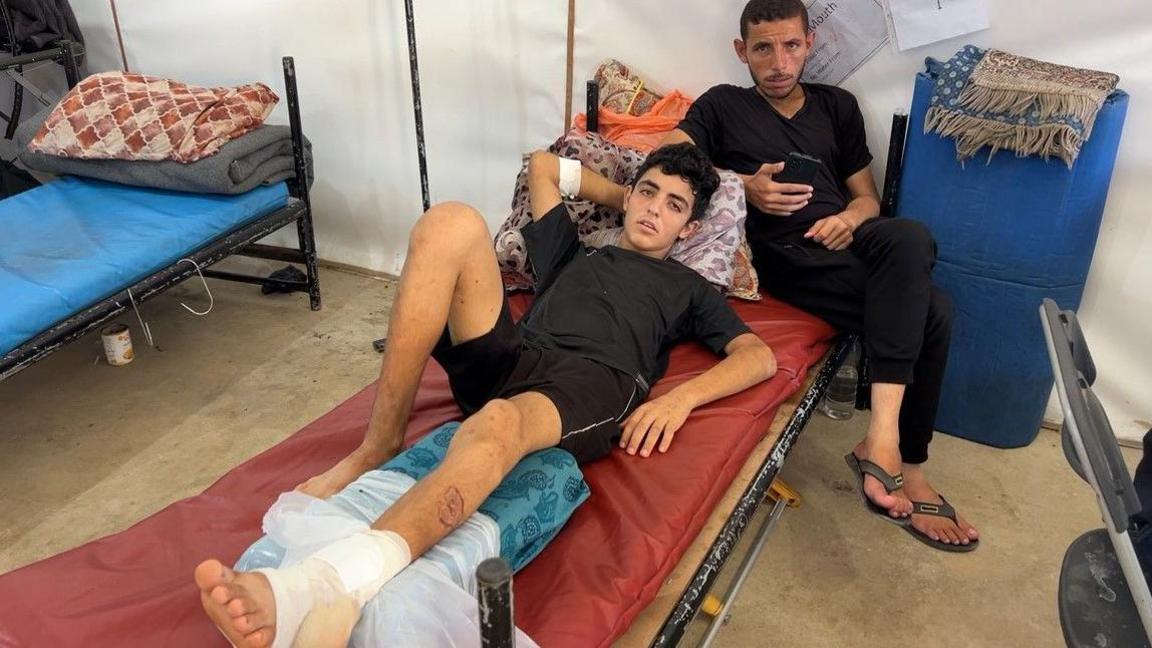
The UN says hundreds of Palestinians have been killed and thousands wounded while seeking aid over the past two months
On Wednesday, over 100 international aid organisations and human rights groups accused Israel of imposing a "siege" on Gaza, causing mass starvation through restricting goods entering Gaza.
When asked to comment, the World Health Organization's executive director Dr Tedros Adhanom Ghebreyesus said: "Mass starvation means starvation of a large proportion of a population, and a large proportion of the population of Gaza is starving."
"It's man-made. And that's very clear. This is because of the blockade."
He added: "[More than 1,000] people have died while trying to feed themselves. If they're not starving, imagine [why they're] risking their lives."
Israel imposed a total blockade of aid deliveries to Gaza at the start of March and resumed its military offensive against Hamas two weeks later, collapsing a two-month ceasefire. It said it wanted to put pressure on the armed group to release its remaining Israeli hostages.
Although the blockade was partially eased after almost two months, amid warnings of a looming famine from global experts, the shortages of food, medicine and fuel have worsened.
The WHO says a quarter of the 2.1 million population is facing famine-like conditions, and that almost 100,000 women and children are suffering from severe acute malnutrition.
Gaza's Hamas-run health ministry says at least 45 people have died as a result of malnutrition since Sunday, including two who died over the last 24 hours.
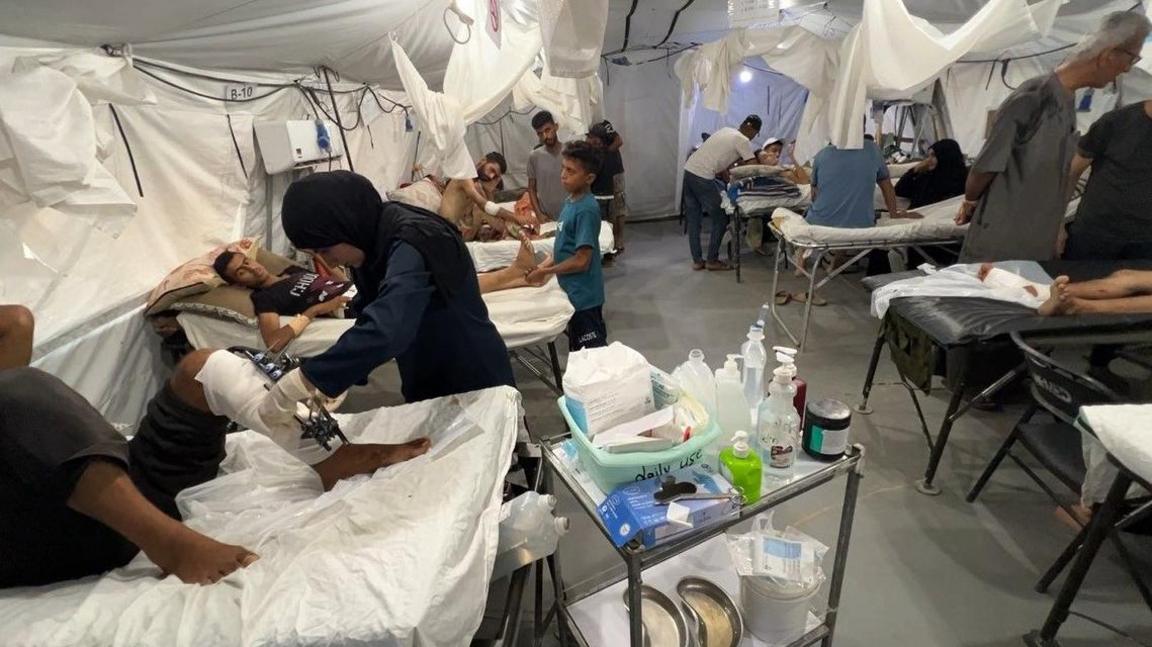
Gaza's healthcare system is on the brink of collapse after 21 months of war
Israel, which controls the entry of all supplies into Gaza, reject the accusation that it is imposing a siege and is responsible for any malnutrition cases.
"In Gaza today, there is no famine caused by Israel. There is, however, a man-made shortage engineered by Hamas," government spokesman David Mencer told a briefing on Wednesday.
"Now, too often the full story is not being told. This suffering exists because Hamas has created it."
Mencer said more than 4,400 lorry loads of aid had entered Gaza over the past two months, but that about 700 lorry loads were waiting for collection at two crossing points for collection by the UN and its humanitarian partners.
"This is a bottleneck which has been caused by the United Nations, and it's the main obstacle to maintaining a consistent flow of humanitarian aid into Gaza," he added.
However, UN agencies have said that it is nearly impossible to co-ordinate safe passage for their convoys with Israeli troops, leaving Palestinians at the mercy of a rapidly expanding starvation that is reaching every family in Gaza.